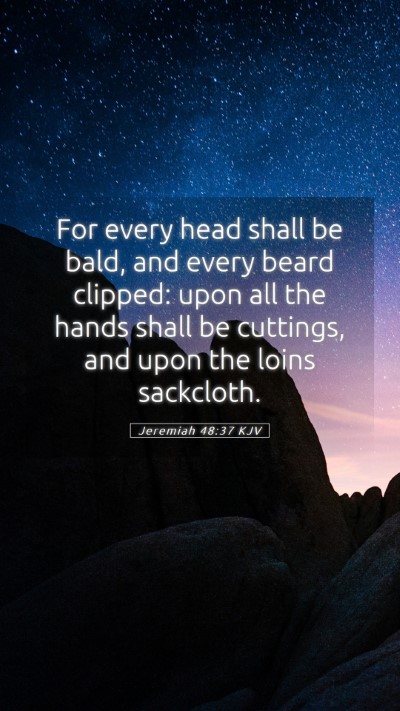Bible Verse Commentary: Jeremiah 48:37
Jeremiah 48:37 states, "For every head shall be bald, and every beard clipped: upon all the hands shall be cuttings, and upon the loins sackcloth." This verse speaks to the profound grief and mourning that the Moabites experience as a result of God's impending judgment upon them.
Understanding Scripture: Key Themes
The key themes within this verse can be understood through several layers:
-
Mourning Practices: The actions described—balding of heads, cutting of beards, and wearing sackcloth—are all traditional symbols of mourning in ancient Near Eastern cultures. These practices signify deep sorrow and signify that the Moabites will grieve extensively due to their hardships.
-
Divine Judgment: The context of this verse indicates a direct connection to God's judgment on Moab. Understanding the historical background, we see that Moab was being punished for its pride and sinfulness. This judgment serves as a warning regarding the consequences of turning away from God.
-
Call to Repentance: The sorrow depicted invites reflection upon the spiritual state of Moab and serves as a significant reminder for readers today about the importance of recognizing sin and repenting.
Bible Verse Interpretations
Various commentaries provide deeper insights into the meaning of this verse:
-
Matthew Henry: Henry highlights the vivid imagery used by Jeremiah, noting how physical expressions of grief underscore the seriousness of the situation. He interprets the baldness and sackcloth as indicators of total desolation and loss, not just physically, but spiritually.
-
Albert Barnes: Barnes elaborates on the cultural practices of mourning, suggesting that these descriptions emphasize the complete devastation that Moab will face. He connects these actions to the broader theme of God’s judgment across nations, indicating that no one can escape divine retribution.
-
Adam Clarke: Clarke emphasizes the symbolic nature of these mourning practices, stating they align with the prophetic tone throughout Jeremiah's writings. He suggests that such drastic expressions of grief reveal the depth of suffering that sin can cause in communities, as well as the consequences of turning away from God's ways.
Application of Bible Verses to Daily Life
For modern readers, understanding Jeremiah 48:37 encourages self-examination and engagement in sincere reflection over our own lives:
-
Grief as a Response: This verse highlights the importance of recognizing our wrongs. Mourning can lead to a healthy attitude towards repentance. Understanding our failings may help us to seek reconciliation more earnestly.
-
Collective Responsibility: The verse serves as a reminder that the actions of a community can lead to spiritual and moral outcomes that affect its entirety. It stresses the need for communities to align themselves with God’s teachings to avoid such grief.
-
Hope Amidst Mourning: While the verse clearly depicts suffering, it is significant for readers to remember that God’s judgment can also lead to restoration and hope for those who return to Him in repentance.
Bible Study Insights: Cross References
To gain a fuller understanding of the themes in Jeremiah 48:37, consider these related verses:
- Isaiah 15:2-3: Discusses similar mourning practices employed by the Moabites.
- Jeremiah 25:9: Mentions the judgment upon nations and the consequences of their actions.
- Ezekiel 27:30: Calls attention to the lamentations of those facing God’s judgment.
- Joel 1:8: A depiction of mourning due to loss and the call for heartfelt repentance.
- Lamentations 5:16: Reflects on the sorrow and consequences of straying from God's ways.
Conclusion: In-Depth Bible Verse Analysis
Jeremiah 48:37 goes beyond a simple description of mourning; it is a profound commentary on the relationship between sin and suffering. Through historical context, cultural practices of grief, and divine judgment, these elements intertwine to provide a rich tapestry of meaning that calls both Moab and today’s reader to a deep and personal understanding of their relationship with God. Engaging with resources and bible study guides can lead to greater insights, making this verse relevant for both personal reflection and community discussions.


